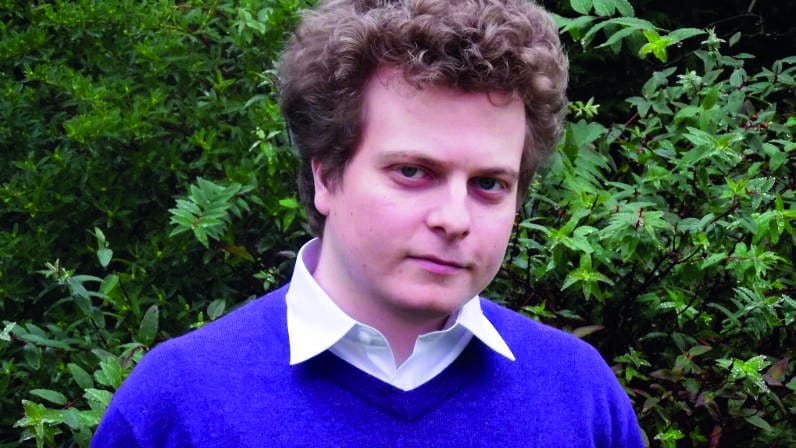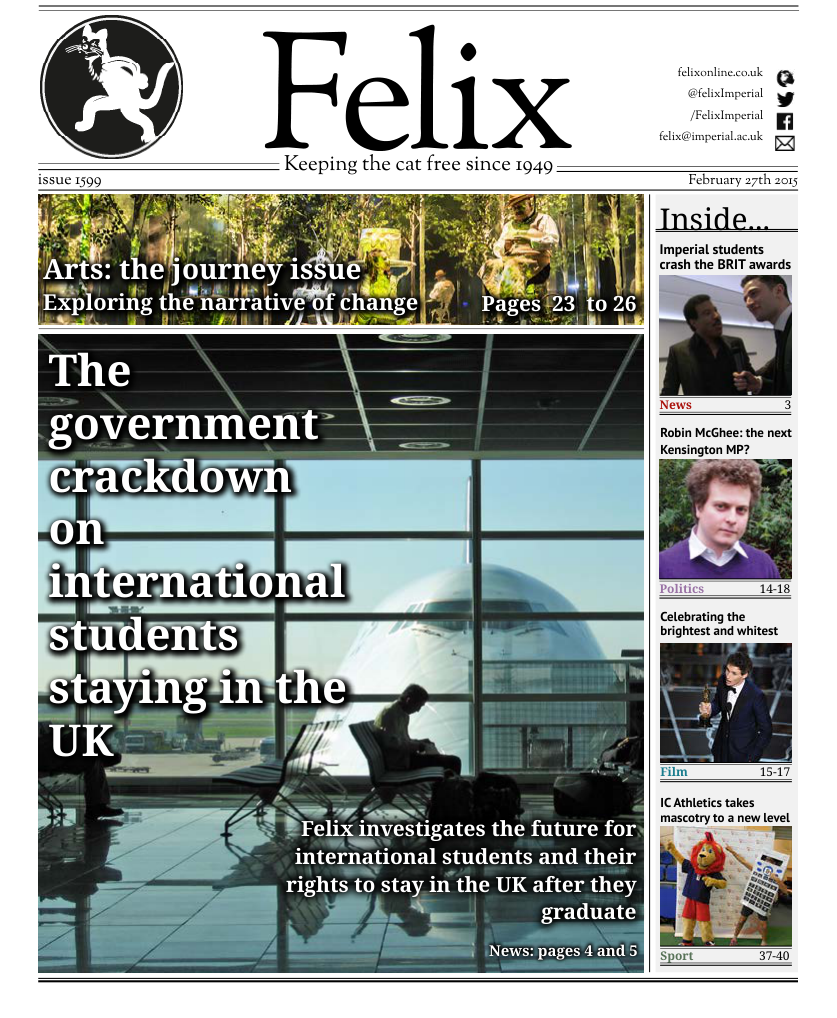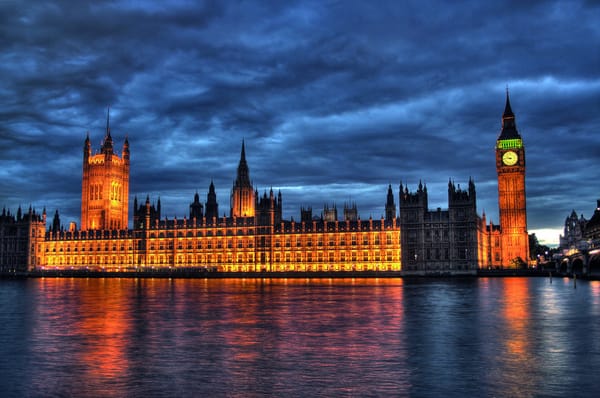An interview with Robin McGhee
Joshua Renken interviews the Liberal Democrat parliamentary candidate for Kensington

At 23 years old, Robin McGhee has already been involved with the Liberal Democrats for over a decade. While reading History at Oxford University, Robin affirmed his interest in politics and stood for a local council seat. Since graduating, he has been involved in television, journalism, research, and has worked for Lib Dem MPs. In November of last year Robin was selected to be the Liberal Democrat parliamentary candidate for Kensington. I spoke with him to discuss constituency matters and national politics.
Joshua Renken: What was it that inspired you to get into politics?
Robin McGhee: It’s just the best way possible of actually helping people and achieving anything, and it’s incredibly interesting. I’ve never encountered a person who doesn’t have some kind of interest in politics, because politics is everything. Politics encompasses all aspects of... well not to sound pretentious, but human behaviour. So I just don’t understand how people couldn’t be interested in it. It’s fascinating and the best way of changing people’s lives, often for the better, often for the worse.
JR: What do you think you would bring to Kensington, if elected as MP?
RMG: The first thing I’d bring is I’d be the youngest MP elected, because I’m 23. I would bring someone who is genuinely interested in everyone in the borough, unlike the current Tory incumbent who is only interested in the hyper wealthy.
I would be someone who is interested in solving the housing crisis that we currently have in the capital, especially in Kensington. Somebody who is interested in looking seriously, nationally at how we can change the way our democracy works to bring about proper political reform. Somebody who’s going to stand up for all residents of Kensington. You know Kensington has lots of very poor areas and lots of very rich areas.
I would be somebody who’s genuinely interested in social mobility and creating a more equal society. And somebody also who is willing to speak their mind. I would want to be a very strong, independently minded backbench MP who is entirely interested in getting stuff done. And getting stuff done in an imaginative way, not in a boring way of going along with what the system likes, which is what I think too many MPs like.
JR: What are the key issues you feel need to be addressed in the local area, and what could you do better than the current Tory incumbent Malcolm Rifkind MP?
RMG: Pretty much anything because Rifkind is completely hopeless.
In Kensington I think the really important issues are basically housing, and the closely related issue of small businesses; which sound kind of boring, but actually small businesses rely entirely on an effective community. In Kensington at the moment we have a very worrying situation where large parts of the borough are bought by foreign property investors, and abandoned and nobody actually goes there.
So it’s a terrible buy-to-leave situation. This is ignoring the extraordinary disaster of extreme property price increases. So that’s obviously a very big issue.
Education is also extremely important because the borough’s schools are very divided. You have a huge number of extremely elite schools, you know... good, but you also have a very large number of schools with overwhelmingly working class and ethnic minority students which is not good because it indicates a social and indeed cultural divide. Which is obviously a very bad thing. So it would be quite useful if we could not have that.
JR: How would you go about solving the housing problem?
RMG: Well the problem is so giant that no single MP could solve it. But one thing that I’d want to do in particular is work as an MP for the rights of the people who have possibly been subject to bad landlords which we have a lot of, unfortunately, in the borough. And also be an active voice for introducing some kind of sanity in the housing market. For example abolishing buy to leave property laws altogether which is extremely damaging to literally everybody in the entire country. Also working to introduce some sort of national discussion and organisation for serious analysis for what the property market is actually doing to our entire society.
We need to think about the next generation, which you and I are part of. We need to think about what this is going to do to our society. I’m pretty concerned that we are currently moving to a feudal situation where basically people are going to have to inherit property from their parents like it’s the 13th century or something, in order to own property outright.
But I’d like to emphasise that in Kensington and Chelsea specifically, I’m more concerned about buy to leave because that is a totally extreme manifestation of investing in property. So I think it’s important to emphasis that I’d want to tackle that as an MP rather than move onto the enormous, all-consuming question of what we are going to do about the housing crisis. I’d want to concentrate on what I can do in the borough specifically.
JR: What could you do for Imperial students who live in the Kensington constituency?
RMG: Well, I am actually roughly their age, which is quite useful. All the other candidates are certainly not in their early twenties. First of all I want to abolish tuition fees, and be a strong voice in that area of policy. I’d want to make sure that we increase investment in science and engineering education in Britain. I’m also genuinely personally interested in mathematics and astrophysics in particular, and evolutionary biology. I think that, like again, it sounds very pretentious but, I want to defend the fact that we need knowledge and understanding for its own sake, which not enough politicians do. Including in my own party.
I want to be somebody who actually defends what it is to be a student, in addition to championing British universities internationally and in parliament.
I should add the Lib Dems have introduced a postgraduate loan system for the first time, which I want to spend quite a lot of time working on how we expand thatw when it’s introduced in 2016. I think Imperial would really benefit from that. One more thing, I’m also very interested in the legalisation of cannabis, which is obviously something that students are interested in.
JR: Do you feel that the coalition has been a success?
RMG: Yes. Because, bearing in mind nobody thought it would be a success at all, the Liberal Democrats have achieved a huge amount that we would obviously never have achieved otherwise. We’ve introduced the pupil premium for schools that have particularly large numbers of pupils who aren’t very well off. We’ve abolished income tax for everyone earning under £10,000 which the Tories and Labour ridiculed and condemned before the election but we’ve actually been able to do this. We really emphasised the environment by introducing for example the green investment bank. We’ve provided also a huge break on numerous Conservative policies. The most extreme are things like abolishing basically all employment rights, allowing companies to fire people at will. Basically totally privatising the NHS. So really it’s pretty remarkable what we’ve prevented the Tories from doing and also what we’ve managed to achieve given that we have a fifth as many MPs as the Tories and no governing experience before the coalition.
Generally speaking when people discover how much we’ve achieved they are willing to give us a lot of credit. We’ve done this in the face of an almost unanimously hostile media, a very hostile Labour Party and generally in bad circumstances. There are however a couple of things were we haven’t been successful.
JR: How can students trust your party again after the broken promise on university tuition fees?
RMG: First of all many Lib Dem MPs abstained and secondly the change in tuition fees is not actually the kind of atrocity that it was depicted as.
Let’s look at what the other two parties were saying; The Tories wanted to take the cap off tuition fees. Basically privatise the whole thing. If you look at what Labour actually said before the election, they said at minimum they would want to be having at minimum a much, much larger cap than £9000. Lib Dems changed the amount you have to earn before you pay it back so that it’s not very much at all. I know this because I’ve done it. So frankly the deal that we actually got was really very good. But most MPs were going after even more generous loans. And like I said we’ve introduced postgraduate loans in the most recent budget.
Labour had the opportunity for thirteen years and they didn’t even care. The Tories certainly don’t care. This is very much what we’re doing so I think our record on student issues has been pretty positive.
And by the way I certainly wouldn’t have voted for the change in tuition fees because I think that higher education should be free.
JR: Why do you think the Lib Dems are doing so poorly in the opinion polls?
RMG: Very simple. The simple fact of being in government. It literally doesn’t matter who with. That is easily enough to lose us a huge chunk of our support.
Basically a lot of people voted for before the coalition us just because we were the default opposition party. And I think the simple fact of losing that is responsible of two thirds of the support that we’ve lost at least. I mean I’m not denying we’ve made mistakes, or that the party leadership has made mistakes. But I mean, come on. We were considered a protest party. And we don’t want to be.
JR: What do you think of our position in the EU?
RMG: The Lib Dems ran very strong pro-EU campaign in the European elections and we were the only party to do so at all. And I’m very pleased with that because the EU is basically a very good thing. It gives us vast influence across the world, which we otherwise wouldn’t have, and it allows favourable trading systems to be developed. My problem with the Lib Dem election campaign was that we didn’t talk about reforming the EU because it is deeply undemocratic. It’s not that there’s no democracy there but we should be electing the commission as well as parliament. Really I would say the EU is a good thing but we need to reform it.
JR: And our immigration policy?
RMG: On immigration, I want to change the system so that we are thinking about who is coming in not what country they are from. And that means that Imperial students can come in easily.
JR: If you could scrap any law or policy which one would you go for?
RMG: I would just say we’re not going to support countries such as Saudi Arabia, which is a flat out theocratic terror state that kills its own people. If we scrapped these sorts of foreign alliances I think this would send a strong sort of message to the world.
JR: Do you think age matters when you become a member of parliament?
RMG: I think it’s important to have as broad a range as possible in parliament.
That also means having more old people in parliament.
JR: Favourite columnist?
RMG: Peter Oborne.
JR: Favourite newspaper?
RMG: The Guardian.
JR: What was the last work of fiction you read?
RMG: ‘The Gun Seller’ by Hugh Laurie
JR: Favourite Book?
RMG: Probably ‘The Road To Wigan Pier’ by George Orwell
JR: Are you religious?
RMG: No. Complete atheist.
JR: House of Cards or West Wing?
RMG: House of Cards
JR: Favourite current Lib Dem MP?
RMG: Julian Huppert
JR: Favourite MP who isn’t a Lib Dem?
RMG: William Hague
JR: In the latest QS world university rankings Imperial College was joint second with Cambridge, while Oxford was a frankly abysmal fifth place. That said, do you prefer the term ‘Impbridge’ or ‘Camperial’?
RMG: Good question. I think ‘Camperial’ sounds better.






